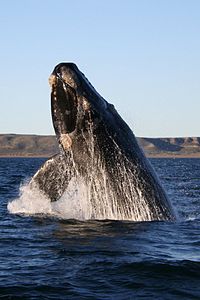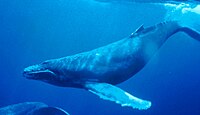
A deep dive into fat: Investigating blubber lipidomic fingerprint of killer whales and humpback whales in northern Norway
Sign Up to like & getrecommendations! Published in 2021 at "Ecology and Evolution"
DOI: 10.1002/ece3.7523
Abstract: Abstract In cetaceans, blubber is the primary and largest lipid body reservoir. Our current understanding about lipid stores and uses in cetaceans is still limited, and most studies only focused on a single narrow snapshot… read more here.
Keywords: killer whales; lipidomic fingerprint; killer; humpback whales ... See more keywords

High Levels of Legacy and Emerging Contaminants in Killer Whales (Orcinus orca) from Norway, 2015 to 2017.
Sign Up to like & getrecommendations! Published in 2021 at "Environmental toxicology and chemistry"
DOI: 10.1002/etc.5064
Abstract: Little is known of the movement or presence of unregulated, emerging contaminants in top predators. The aim of the present study was to conduct the first screening of legacy and emerging contaminants in multiple tissues… read more here.
Keywords: killer whales; emerging contaminants; chemistry; legacy emerging ... See more keywords

Aspects of the ecology of killer whale (Orcinus orca Linn.) groups in the near-shore waters of Sub-Antarctic Macquarie Island
Sign Up to like & getrecommendations! Published in 2018 at "Polar Biology"
DOI: 10.1007/s00300-018-2361-y
Abstract: Occurrences of killer whales (Orcinus orca) in the waters surrounding Sub-Antarctic Macquarie Island have been recorded since the 1820s; however, their presence only became the focus of scientific research in the mid-1990s. The analyses of… read more here.
Keywords: killer whales; island; macquarie island; sub antarctic ... See more keywords

Are vitamins A and E associated with persistent organic pollutants and fatty acids in the blubber of highly contaminated killer whales (Orcinus orca) from Greenland?
Sign Up to like & getrecommendations! Published in 2019 at "Environmental research"
DOI: 10.1016/j.envres.2019.108602
Abstract: We quantified blubber concentrations of vitamins A (retinol) and E (α-tocopherol) and evaluated associations with persistent organic pollutants (ΣPOPs) in 14 highly-contaminated killer whales (Orcinus orca) sampled in Greenland from 2012 to 2014. We considered… read more here.
Keywords: killer whales; killer; blubber; layer ... See more keywords

High concentrations of persistent organic pollutants in adult killer whales (Orcinus orca) and a foetus stranded in Ireland.
Sign Up to like & getrecommendations! Published in 2019 at "Marine pollution bulletin"
DOI: 10.1016/j.marpolbul.2019.110699
Abstract: Bio-accumulation of persistent organic pollutants including polychlorinated biphenyls (PCBs), brominated flame retardants and organochlorine pesticides continue to be of major concern for marine apex predators such as killer whales. The concentrations of 16 polychlorinated biphenyls,… read more here.
Keywords: killer whales; organic pollutants; stranded ireland; persistent organic ... See more keywords

Emerging Contaminants and New POPs (PFAS and HBCDD) in Endangered Southern Resident and Bigg's (Transient) Killer Whales (Orcinus orca): In Utero Maternal Transfer and Pollution Management Implications.
Sign Up to like & getrecommendations! Published in 2022 at "Environmental science & technology"
DOI: 10.1021/acs.est.2c04126
Abstract: Killer whales (Orcinus orca) have been deemed one of the most contaminated cetacean species in the world. However, concentrations and potential health implications of selected 'contaminants of emerging concern' (CECs) and new persistent organic pollutants… read more here.
Keywords: killer whales; maternal transfer; killer; southern resident ... See more keywords

Competing tradeoffs between increasing marine mammal predation and fisheries harvest of Chinook salmon
Sign Up to like & getrecommendations! Published in 2017 at "Scientific Reports"
DOI: 10.1038/s41598-017-14984-8
Abstract: Many marine mammal predators, particularly pinnipeds, have increased in abundance in recent decades, generating new challenges for balancing human uses with recovery goals via ecosystem-based management. We used a spatio-temporal bioenergetics model of the Northeast… read more here.
Keywords: killer whales; marine mammal; salmon; chinook salmon ... See more keywords

Cold call: the acoustic repertoire of Ross Sea killer whales (Orcinus orca, Type C) in McMurdo Sound, Antarctica
Sign Up to like & getrecommendations! Published in 2020 at "Royal Society Open Science"
DOI: 10.1098/rsos.191228
Abstract: Killer whales (Orcinus orca) are top marine predators occurring globally. In Antarctic waters, five ecotypes have been described, with Type C being the smallest form of killer whale known. Acoustic recordings of nine encounters of… read more here.
Keywords: killer whales; killer; orcinus orca; mcmurdo sound ... See more keywords

Observations and tracking of killer whales (Orcinus orca) with shore-based X-band marine radar at a marine energy test site
Sign Up to like & getrecommendations! Published in 2017 at "Marine Mammal Science"
DOI: 10.1111/mms.12395
Abstract: The Atlantic killer whale (Orcinus orca) is a top-level marine predator with a global range, being found in all of Earth’s oceans. The potential interaction between killer whales and marine renewable energy projects requires surveillance… read more here.
Keywords: killer whales; energy; marine; marine radar ... See more keywords

Social behavior increases in multipod aggregations of southern Alaska resident killer whales (Orcinus orca)
Sign Up to like & getrecommendations! Published in 2020 at "Marine Mammal Science"
DOI: 10.1111/mms.12715
Abstract: Correspondence Daniel W. Olsen, 3430 Main Street Suite B-1, Homer, AK 99603. Email: [email protected] Abstract Killer whales (Orcinus orca) are highly social and occasionally gather in large aggregations that reach 150 individuals. During 338 encounters… read more here.
Keywords: killer whales; probability; number; social behavior ... See more keywords

Increased presence of mammal-eating killer whales in the Salish Sea with implications for predator-prey dynamics
Sign Up to like & getrecommendations! Published in 2018 at "PeerJ"
DOI: 10.7717/peerj.6062
Abstract: The inland waters of Washington State and southern British Columbia, collectively known as the Salish Sea, comprise key habitat for two regional populations of killer whales (Orcinus orca): the mammal-eating West Coast Transients and the… read more here.
Keywords: killer whales; presence; sea; mammal eating ... See more keywords